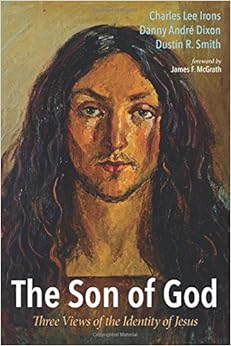This week I have responded to Dale Tuggy's podcast regarding apologist's mistakes arguing for the Triune God. It's a good episode and very clearly organised as usual, although I think points 1 and 4 could have possibly been combined.
If you are interested (and to make the most sense of my questions to Dale), please check out the episode here :)
Mistake 5. New fangled slogans and grandiose claims
"Gospel and Trinity inseparable". For small-t trinitarians could this not actually be the case? I think it is my case.
4. Dubious proofs of the Trinity from reason
Fallacy: God is perfectly loving only if God is perfectly loving? Is it not rather the fallacy that "God is perfectly loving only if He can be seen to be perfectly loving, i.e. love has to be worked out? I think it is to assume that he has an opportunity to express that love. Is the fallacy not then that this is to presume that God requires the same opportunities to validate that loving characteristic. I cannot really know if I am loving if I do not see it working in my life because I am developmental. God surely is not developmental, right? Also, a ("previously") timeless God still knew that in time he would fully demonstrate his immeasurable love perfectly. That perfect foreknowledge was with Him, correct?
Honesty on a desert island example. Is he compassionate? He might be. Is **might** be enough? Might he also NOT be? Not being God, how can he (or any secret observer) even know? It is not at all obvious to me that he can be said to *be* honest, except perhaps with respect to self-honesty, or honesty within himself (i.e. between his conscious and unconscious).
I think I am "yes" for the fallacy, and "no" for the desert island. :)
3. Speculation about atonement. Agreed.
2. Confusing Trinity with the deity (or even full deity) of Christ. Logos theories were saying this. Is this not also when Docetism hit, which is often confused with God Almighty coming as visible Spirit but not as flesh?
You say: "Originally the Psalm was addressed to a King". Here you were referring to the Psalm referenced in Hebrews 1:8, Psalm 45. Who would have thought those psalm introductory notes would have had an effect on Christology!? But I think they do. So the question I am wrestling with and I ask you if you have had any insight, is could there be confusion (prior 1st century) regarding the addressee of Psalm 45? In several non-Psalter contexts, the words translated "of David" are "to David". But in quite a few places in the Psalms it does seem correctly rendered "of David". If it is correctly David writing, then how natural was it for Israelite kings to address other humans, even their sons, as their Lords? Are there other possibilities, e.g. re-ordering and compiling the psalter resulting in confused introductory comments? This theory has problems because of how Jesus interpreted it - that David is indeed the speaker, even though he definitely doesn't sound like it to me. I'd be really interested to hear your views on this!
1. Linguistic sophistry, echad and Elohim. I actually think this point is quite similar to 4. Is the Schema not more appropriately understood as "YHWH alone"? Why on Earth would it say "YHWH is One"? There are some very obvious reasons for declaring within the Israelites community that there is no space for more than one god.
Out of respect for the Divine name, YHWH is not transliterated but they just replaced it with The Lord. Hurtado blogged about this, citing especially John William Wevers' research into Kyrios in the LXX: "confirming that YHWH is overwhelmingly rendered by forms of kyrios without the definite article (“anarthrous” forms). In contrast, forms of the word with the definite article (“articular”) are preferred to translate references to other figures who hold a lordly position in the narratives. As one example, check out Genesis 39:2-3, where the LXX has κυριος (without article) for YHWH consistently, and articular forms of κυριος to translate references to the human/Egyptian “master” in the narrative." (https://larryhurtado.wordpress.com/2014/08/22/yhwh-in-the-septuagint/)
So regarding the Rule of thumb (unless NT is quoting the OT, the Lord is referring to the Lord Jesus), I wonder if there might be an extra tweak (or simply confirmation) available there to us through the anarthrous kurios data.
If you are interested (and to make the most sense of my questions to Dale), please check out the episode here :)
Mistake 5. New fangled slogans and grandiose claims
"Gospel and Trinity inseparable". For small-t trinitarians could this not actually be the case? I think it is my case.
4. Dubious proofs of the Trinity from reason
Fallacy: God is perfectly loving only if God is perfectly loving? Is it not rather the fallacy that "God is perfectly loving only if He can be seen to be perfectly loving, i.e. love has to be worked out? I think it is to assume that he has an opportunity to express that love. Is the fallacy not then that this is to presume that God requires the same opportunities to validate that loving characteristic. I cannot really know if I am loving if I do not see it working in my life because I am developmental. God surely is not developmental, right? Also, a ("previously") timeless God still knew that in time he would fully demonstrate his immeasurable love perfectly. That perfect foreknowledge was with Him, correct?
Honesty on a desert island example. Is he compassionate? He might be. Is **might** be enough? Might he also NOT be? Not being God, how can he (or any secret observer) even know? It is not at all obvious to me that he can be said to *be* honest, except perhaps with respect to self-honesty, or honesty within himself (i.e. between his conscious and unconscious).
I think I am "yes" for the fallacy, and "no" for the desert island. :)
3. Speculation about atonement. Agreed.
2. Confusing Trinity with the deity (or even full deity) of Christ. Logos theories were saying this. Is this not also when Docetism hit, which is often confused with God Almighty coming as visible Spirit but not as flesh?
You say: "Originally the Psalm was addressed to a King". Here you were referring to the Psalm referenced in Hebrews 1:8, Psalm 45. Who would have thought those psalm introductory notes would have had an effect on Christology!? But I think they do. So the question I am wrestling with and I ask you if you have had any insight, is could there be confusion (prior 1st century) regarding the addressee of Psalm 45? In several non-Psalter contexts, the words translated "of David" are "to David". But in quite a few places in the Psalms it does seem correctly rendered "of David". If it is correctly David writing, then how natural was it for Israelite kings to address other humans, even their sons, as their Lords? Are there other possibilities, e.g. re-ordering and compiling the psalter resulting in confused introductory comments? This theory has problems because of how Jesus interpreted it - that David is indeed the speaker, even though he definitely doesn't sound like it to me. I'd be really interested to hear your views on this!
1. Linguistic sophistry, echad and Elohim. I actually think this point is quite similar to 4. Is the Schema not more appropriately understood as "YHWH alone"? Why on Earth would it say "YHWH is One"? There are some very obvious reasons for declaring within the Israelites community that there is no space for more than one god.
Out of respect for the Divine name, YHWH is not transliterated but they just replaced it with The Lord. Hurtado blogged about this, citing especially John William Wevers' research into Kyrios in the LXX: "confirming that YHWH is overwhelmingly rendered by forms of kyrios without the definite article (“anarthrous” forms). In contrast, forms of the word with the definite article (“articular”) are preferred to translate references to other figures who hold a lordly position in the narratives. As one example, check out Genesis 39:2-3, where the LXX has κυριος (without article) for YHWH consistently, and articular forms of κυριος to translate references to the human/Egyptian “master” in the narrative." (https://larryhurtado.wordpress.com/2014/08/22/yhwh-in-the-septuagint/)
So regarding the Rule of thumb (unless NT is quoting the OT, the Lord is referring to the Lord Jesus), I wonder if there might be an extra tweak (or simply confirmation) available there to us through the anarthrous kurios data.





